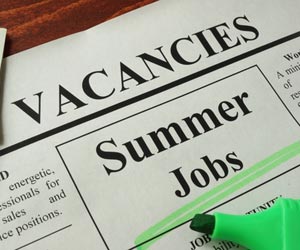Finding Summer Work
Do you know the best time to start searching for your perfect summer job? If you’re not quite sure then JobMonkey is going to be a great tool for you.
Each section of JobMonkey includes information about jobs available in specific industries, tips for applying, and when to apply. It’s also very important to know where to look for summer jobs, whether they’re Alaska fishing jobs, summer camp jobs, dude ranch jobs, or seasonal tour guide jobs.

Given that summer jobs fit nicely around the class schedules of college students, it’s no surprise that college newspapers and job centers receive dozens of summer job announcements beginning in late-fall and peaking in February.
Some summer outdoor jobs, such as those with the National Park Service, have very strict and specific job application deadlines. Missing the deadline could mean missing out on the opportunity of a lifetime! Furthermore, a good number of the top seasonal employers have up to 50% of their workforce returning from year to year. Competition for the remaining open jobs can be fierce. Once the jobs are filled, they’re filled. So it’s important to be proactive in your job search and start applying early.
High Demand Summer Jobs
At JobMonkey we have learned that some types of summer jobs are always in high demand. If you are a trained and/or experienced cook, then you are coveted! Wilderness lodges in Alaska, cruise ships, fishing boats, and summer camps are among the seasonal employers would like to speak with you today. There simply are not enough good cooks willing to pack their bags and move somewhere remote for the summer.
Summer bus drivers and tour van drivers are also in short supply. Summer employers, it seems, they never have enough qualified drivers to ferry customers from the airport or around the nearest national park. As a tour bus driver you typically need a special driver’s license and clean driving record. Sometimes the bus or van driver doubles as a tour guide, and when this is the case you’ll need good speaking and story-telling skills, a sense of humor, and knowledge of local events and history.
Fishing Jobs in Alaska
Summer jobs in Alaska’s fishing industry are available from mid-May through October.
Many of the onshore employers, what we call processing plants, maintain corporate offices in Seattle, Washington, and enjoy having walk-in applicants as early as February or early-March. If you can’t apply in person, then visit the employer’s website (if they have one) and complete the online application. Many onshore salmon processing plants will also take faxed applications and/or emailed resumes and conduct phone interviews. Once it gets to be June or July the only way to get a job at a processing plant is to be at the plant when they’re hiring.
Jobs on salmon fishing boats are harder to come by. Again, the majority of the fishing fleet is located during the offseason in Seattle. Sometimes, fishing boat owners and skippers will post deckhand jobs in the Seattle newspaper and on some fishing industry job websites. Many skippers will also meet prospective deckhands at the marina in May.
Tips for getting an Alaska fishing or processing job are available in our Alaska jobs section. We have over 15 years of Alaska seafood industry knowledge!
Summer Job Postings
It’s alluded to above, but the majority of summer job openings are posted on college campuses and on websites like JobMonkey that attract people who want cool summer jobs.
Our research shows that dude ranch jobs, for instance, are advertised as early as November for openings the next summer. Large employers, who may need 50 hospitality workers, 10 kitchen staff, 8 front desk staff, 4 bus drivers, and so on, need to start recruiting as early as possible and may continue recruiting during the season.
It’s a good idea to utilize the Internet to locate your ideal employer choices, and to initiate contact with hiring directors before the holiday season. Find out when they’ll begin hiring in earnest and how to make sure you’ll be on the ‘contact’ list.
Remember, look for summer job postings in these places:
- College newspapers
- College job center websites
- Summer employer websites
- Seasonal job boards (like JobMonkey)
- Newspapers located in the largest cities near your targeted employer
After reading the material on JobMonkey you might consider putting a ‘reminder’ on your Outlook Calendar, or on whatever calender you use, to start your job search on November 15, to look again in January, February, and March. Having a solid reminder ensures you won’t miss important application windows.


 Teach English in Asia
Teach English in Asia  Cruise Ship Jobs
Cruise Ship Jobs  Alaska Fishing Industry Jobs
Alaska Fishing Industry Jobs  Sharing Economy / Gig Economy
Sharing Economy / Gig Economy